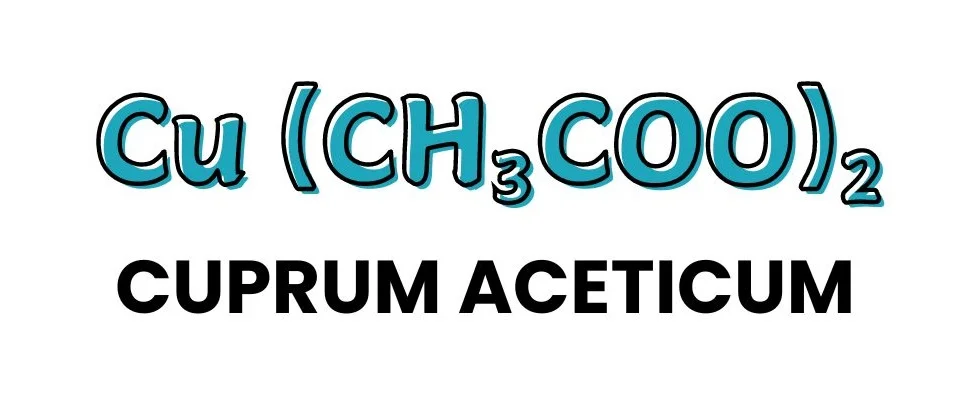Cuprum Aceticum, commonly known as Acetate of Copper, is a homeopathic remedy derived from copper.
This remedy is primarily indicated for conditions involving intense spasms, neurological symptoms, and certain skin diseases.
It is particularly noted for its effects on the respiratory system and the gastrointestinal tract.

Table of Contents
ToggleSOURCE INFORMATION
Scientific Classification
- Kingdom: Mineral
- Element: Copper (Cu)
- Compound: Acetate of Copper (Cu (CH₃COO)₂)
Origin
- Cuprum Aceticum is prepared by combining copper with acetic acid.
- It is used in both homeopathy and traditional medicine for its therapeutic properties.
Historical Facts
- Copper has been utilized since ancient times for its antimicrobial properties and is known for its applications in various medical treatments.
- The homeopathic preparation, Cuprum Aceticum, was established in the 19th century as homeopathy gained popularity, particularly in Europe.
DRUG PATHOGENESIS
- Cuprum Aceticum acts on the nervous system and various organs, leading to symptoms that are marked by spasms, intense pain, and a general state of unease.
- It influences the respiratory and gastrointestinal systems, causing constriction and spasmodic responses.
CONSTITUTION
- Cuprum Aceticum is often suited for individuals who are sensitive and nervous, with a propensity for strong emotional reactions that can trigger physical symptoms.
DIATHESIS
- This remedy is indicated for those with a tendency towards neuroses and spastic conditions, exhibiting a need for support during acute emotional stress.
TEMPERAMENTS
- The remedy is most beneficial for those with a sanguine temperament, characterized by a lively disposition, emotional vulnerability, and a tendency toward respiratory ailments.
KEY CHARACTERISTICS
Respiratory Symptoms
- Burning excoriation and paroxysmal cough.
- Tough, tenacious mucus with a sensation of suffocation.
- Attacks of angina pectoris triggered by excitement.
Gastrointestinal Symptoms
- Violent spasmodic pains in the stomach and abdomen.
- Slimy, brown diarrhea accompanied by tenesmus (the feeling of incomplete bowel evacuation).
Neurological Symptoms
- Violent throbbing and lancinating pain in the forehead.
- Neuralgia in the facial area, especially around the cheekbone and upper jaw.
- Mental symptoms including loss of consciousness and a sense of heaviness in the head.
Skin Symptoms
- Eruptions resembling leprosy without itching, appearing in various sizes across the body.
DETAILED ORGAN SYMPTOMS
HEAD
- Violent throbbing: Sudden, intense headaches that may feel like a pulsation.
- Brow ague: Left-sided pain affecting the brow area.
- Neuralgia: Intense facial pain, better with chewing or warmth.
STOMACH
- Spasmodic pain: Sharp, cramping pain often linked with nausea and vomiting.
- Diarrhea: Dark, slimy stool, indicating gastrointestinal distress.
RESPIRATORY
- Dyspnea and spasms: Difficulty breathing and constriction in the chest during anxiety or emotional stress.
- Cough: Sudden, violent coughing fits.
SKIN
- Leprous-like eruptions: Skin conditions without itching, indicating a deeper systemic issue.
MODALITIES
- Worse: Mental emotions, touch, and physical agitation.
- Better: Chewing, pressure, warmth, and lying on the affected side.
RELATIONSHIP WITH OTHER DRUGS
Similar Remedies: Acts similarly to Cuprum metallicum but with more violent effects.
Comparative Remedies
- Cuprum met: Similar spasmodic symptoms.
Other comparisons include
- Nux vomica for gastrointestinal symptoms.
- Belladonna for acute inflammation.
DOSE
- Potency: Typically used in third to sixth trituration.
Frequently Asked Questions
What conditions can Cuprum Aceticum treat?
- It is primarily used for respiratory issues, gastrointestinal spasms, and neurological symptoms.
How is it administered?
- The remedy can be taken in trituration form, with common doses ranging from third to sixth potency.
Can it be used alongside other medications?
- While it is generally safe, it is advisable to consult with a healthcare provider before combining with conventional medications.
Meaning of Difficult Words
- Paroxysmal: Sudden and intense recurrence of symptoms.
- Tenacious: Firmly held; difficult to remove.
- Tenesmus: A constant feeling of the need to evacuate bowels.
- Angina pectoris: A condition marked by severe chest pain due to reduced blood flow to the heart.
- Excoriation: A raw area on the skin caused by abrasion.
- Neuralgia: Intense pain along the course of a nerve.
- Diarrhea: Frequent, loose, and watery bowel movements.
- Eruption: A sudden appearance of a rash or lesion on the skin.
This comprehensive overview of Cuprum Aceticum provides insights into its application in homeopathy, detailing its symptoms, effects, and therapeutic relationships.
Understanding these aspects can assist practitioners in effectively utilizing this remedy for suitable conditions.
